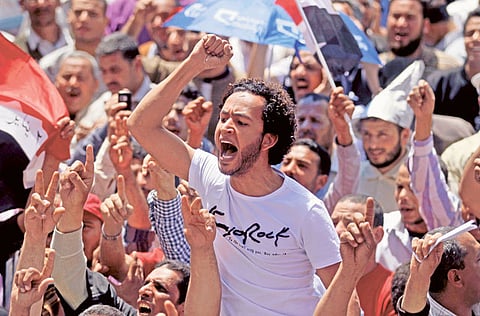Doubts grow over military rulers' agenda
Opposition fears armed forces will not honour promise to quit power by June 30

Cairo: Although he is angry with Islamists for what he calls their manipulation of the anti-Mubarak revolt, Hatem Rashid, an opposition activist, was keen to join them on Friday in a mass protest to denounce the "questionable intentions" of the ruling military.
"I think the real problem in Egypt now is the generals themselves. They look unwilling to hand over power and hold fair presidential elections," he said.
In a protest dubbed the "Friday of self-determination", thousands of anti-military protesters rallied to Tahrir Square, a focal point for 18-day demonstrations that eventually forced Hosni Mubarak to step down. The protesters chanted "down with the military rule", a slogan that has recently been a rallying call for opposition activists of different political stripes in Egypt.
A month before the scheduled presidential vote, Egypt's first since Mubarak's removal, doubts are growing that the military rulers will quit power by June 30 as they previously promised under popular pressure.
The doubts were triggered after Hussain Tantawi, the country's military ruler, recently suggested that the constitution should be written before the elections. Opponents believe that one month is not enough to draft the constitution, which has to be put up for a public vote before being ratified.
The military scrapped the old constitution days after it took after Mubarak in February last year.
The deputy leader of the influential Muslim Brotherhood, Khairat Al Shater, believes that the military is reluctant to step down.
Disqualified
"The failure of the [ruling] military council to endorse the law passed by the parliament banning the remnants of the former regime reflects a new attempt from it [the council] to allow the Mubarak regime to come back," Al Shater told a rally in Cairo after he was disqualified from running in the presidential elections.
Another banned Islamist contender, Hazem Salah Abu Esmail, is disaffected with the military. Abu Esmail, a populist anti-US radical Salafist, has accused the military of "colluding" with Washington to exclude him from the race. His supporters have been staging a strike in Cairo to "denounce the conspiracy against the Shaikh" — their affectionate nickname for Abu Esmail.
Even non-Islamist politicians have threatened a second "street revolution" if the military reneged on its pledge to leave power by June 30.
"The revolutionaries will return to Tahrir and will not leave it until the military quits power," said George Eshaq, a leading activist in the opposition group Kefaya (Enough).
"The military is behind a lot of problems, including the slow-paced trials of Mubarak and former figures," he added.
On Saturday, Tantawi, a long-time defence minister under Mubarak, pledged to transfer power to an elected civilian administration.
"The armed forces will hand over the country to an elected civilian system and a [new] constitution with which all Egyptians will be pleased," Tantawi was quoted by the state Middle East News Agency as saying at a military drill outside Cairo. There was no mention of the June 30 deadline.
In an apparent sign of anger with detractors, Tantawi said: "We are able to answer any insult directed to the armed forces, but we will not do this so that Egypt will reach the haven of safety." The veteran general added that the military does not favour a "given presidential candidate". Other members of the ruling military council have, meanwhile, denied claims that the army will "tamper" with the result of the coming polls. They cited the army's role in protecting the "fair and free" parliamentary elections held late last year in which the long-banned Islamists made huge gains.
Mistrust
Critics, however, say that by refusing to endorse the parliament's ban on presidential hopefuls from the Mubarak regime, the military sides with those contenders allegedly to preserve the army's economic interests and political clout. The Supreme Constitutional Court said on Saturday it has no jurisdiction to decide on the ban to which the military had referred.
The mistrust of the military coincides with a controversy in Egypt over who should be tasked with drafting the new constitution.
Earlier this month, the Administrative Court suspended the formation of a constitution panel dominated by Islamists. The military is pushing the parliament, where Islamists hold more than two thirds of seats, to compromise on a new composition of the panel.
The constitution is crucial for the army, who has been playing a major role in Egypt in the past six decades.
Sign up for the Daily Briefing
Get the latest news and updates straight to your inbox


